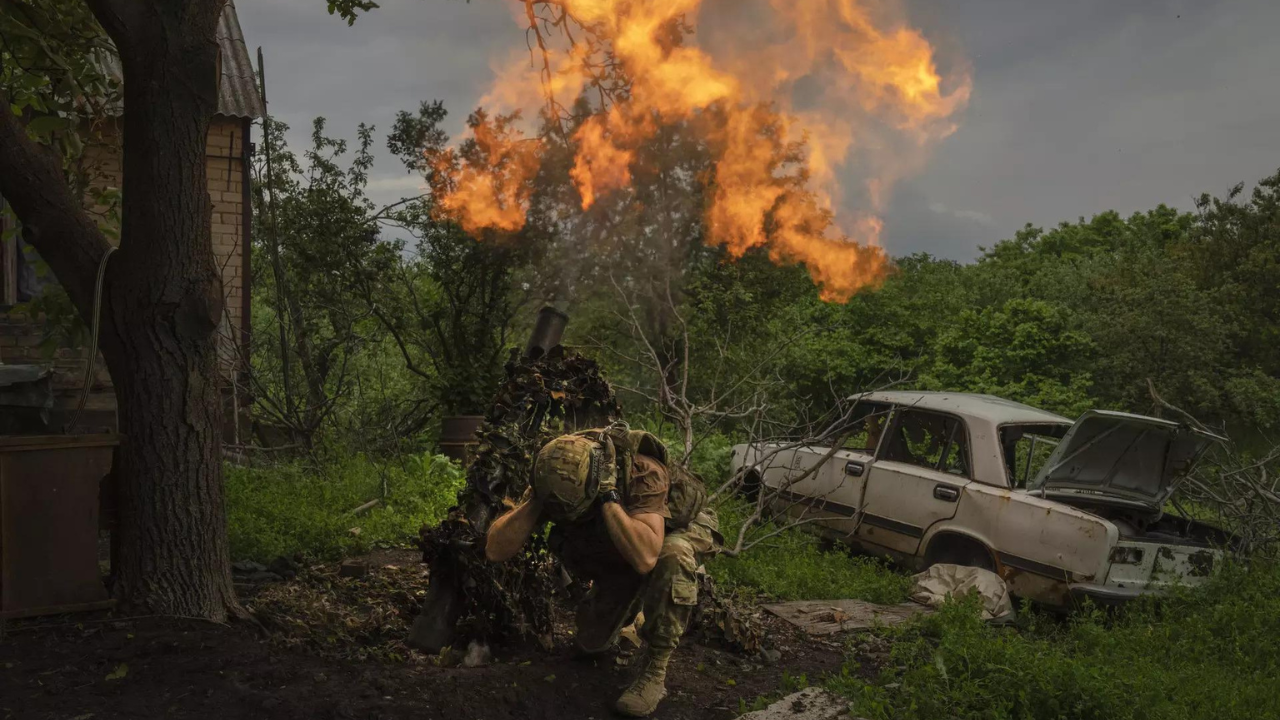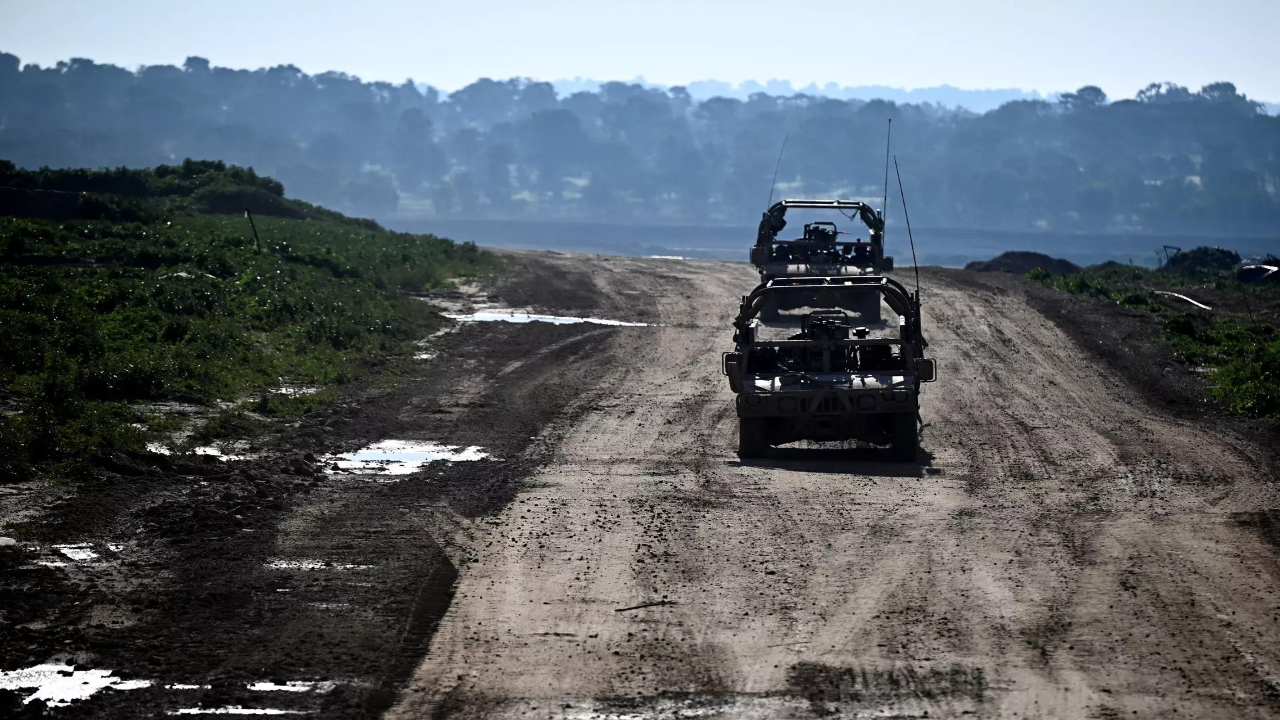Israel-Hamas War Rages In Besieged Gaza On Ramadan Eve
Deadly fighting raged in Gaza on Sunday between Israeli forces and Hamas operatives, with no truce in sight on the eve of the Muslim holy month of Ramadan as a dire humanitarian crisis gripped the besieged Palestinian territory.

Deadly fighting raged in Gaza on Sunday between Israeli forces and Hamas operatives, with no truce in sight on the eve of the Muslim holy month of Ramadan as a dire humanitarian crisis gripped the besieged Palestinian territory.
A Spanish charity ship with food aid prepared to sail from Cyprus to the coastal Gaza Strip, where the UN has repeatedly warned of famine.
Aid groups say only a fraction of the supplies required to meet basic humanitarian needs have been allowed into Gaza since October when Israel placed Gaza under near-total siege.
About 370 kilometres (230 miles) from Cyprus across the Mediterranean Sea, Mohammed Harara stood on the shores of Gaza, hoping for the aid to arrive.
"I've been waiting since this morning, because tomorrow is the start of the holy month of Ramadan and the situation is very tragic," he said.
The non-governmental group Open Arms said its boat would pull a barge with 200 tonnes of food, which its partner the US charity World Central Kitchen would then unload on Gaza's shores.
It was expected to depart "within the coming hours", Cypriot government spokesman Konstantinos Letymbiotis told Cyprus News Agency.
Jordanian, United States, French, Belgian and Egyptian planes parachuted aid over northern Gaza on Sunday, but the United Nation's aid coordinator for the area has said more supply by land is the best way to get assistance to the territory's 2.4 million people.
Picking through dirt
Some of the airdropped food packages smashed open on impact, leaving residents picking through the dirt to salvage what they could, AFPTV images showed.
The war started by the October 7 Hamas attack on Israel has killed 31,045 Palestinians, mostly women and children, according to the health ministry in Hamas-ruled Gaza where vast swathes have been reduced to a bombed-out wasteland.
Weeks of talks involving United States, Qatari and Egyptian mediators have aimed for a six-week truce and the release of many of the hostages that Hamas operatives are still holding, in return for Palestinian prisoners freed from Israeli jails.
The aim had been to halt the fighting by the start of Ramadan, which Saudi Arabia and several other Muslim countries said would begin on Monday after the sighting of the crescent moon.
Ramadan this year is "all pain," said Ahmed Kamis, 40, in Rafah, where around 1.5 million people have tried to find refuge but are still at risk from Israeli bombing -- and a ground operation which Israel has threatened into the southern city.
Both sides have blamed each other for failing to reach a truce deal, after Israel had demanded a full list of surviving hostages, and Hamas had called for Israel to pull out all its troops from Gaza.
Benny Gantz, a member of Israel's war cabinet, said Hamas wants to see "the month of Ramadan go from a month of prayers to a month of blood".
Hamas chief Ismail Haniyeh said Israel "bears responsibility for not reaching an agreement" but his Islamist movement is "open to continuing negotiations."
A source with knowledge of the truce talks told AFP that "there will be a diplomatic push especially in the next 10 days" with a view to securing a deal within the first half of Ramadan.
Exorbitant prices
US President Joe Biden on Saturday stressed his growing impatience with Israel's right-wing Prime Minister Benjamin Netanyahu, telling broadcaster MSNBC that the Israeli leader "must pay more attention to the innocent lives being lost as a consequence of the actions taken".
At this stage, said Biden, Netanyahu's approach to the war was "hurting Israel more than helping Israel".
Netanyahu, under pressure from desperate families of hostages still held in Gaza as well as critics of his government, on Sunday rejected Biden's comments and said most Israelis back "the action that we're taking to destroy the remaining terrorist battalions of Hamas".
He said Israel's military has killed "at least 13,000 terrorist fighters", but did not give details on how the figure was derived.
Hamas's attack which started the war resulted in about 1,160 deaths, mostly civilians, according to Israeli official figures.
The Hamas operatives also took around 250 hostages, dozens of whom were released during a week-long truce in November. Israel believes 99 hostages remain alive and that 31 have died.
The UN has reported particular difficulty in accessing northern Gaza for deliveries of food and other aid.
What is available in the south is sold at exorbitant prices, residents say, making this Ramadan like no other.
Instead of marking the holy month at home, "unfortunately it is clear that we will live in displacement, pain and oppression," said Hassuna, a dentist displaced from Gaza City to Rafah.
Waiting by the seashore
The day before Ramadan, Gaza's health ministry said 85 people had been killed in 24 hours.
The Israeli military said its troops had killed 30 operatives during fighting over the previous day in central Gaza, and in the Khan Yunis area of southern Gaza.
Biden last Thursday announced that the US military would build a temporary pier on Gaza's coast to facilitate larger aid shipments by sea, but this would take up to 60 days, according to the Pentagon.
A ship left Virginia on Saturday carrying the "first equipment to establish a temporary pier", United States Central Command said, while preparations for maritime aid appeared to be taking place in Gaza.
Israel's Defence Minister Yoav Gallant said on social media platform X that he had inspected preparations for "a sea dock" to receive aid that would go "to those who need it" in Gaza.
In the territory's south, trucks and bulldozers cleared a coastal road in what one worker said was an attempt to prepare for arrival of aid by sea.
Further north, Mohammed Abu Baid waited on the shore.
"We won't believe it until we see it," he said.



































![Safari Thorium Neo 8-Wheel Luggage Set Trolley Bags (Set of 3) at just Rs. 5,599 [MRP 29,100]](https://savefree.in/uploads/images/202409/image_870x580_66f63845060f0.webp?#)












![Handmade Brown Mango Wood Chopping Board At just Rs. 89 [MRP 599]](http://savefree.in/uploads/images/202303/image_870x580_641bf7e9c2206.jpg?#)


